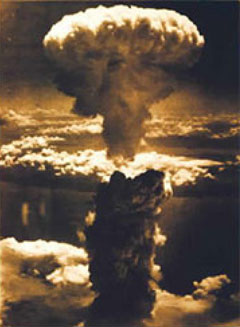Nuclear war could cause global cooling (i.e. block global warming)
Nuclear war could cause global cooling (i.e. block global warming)
Rhett Butler, mongabay.com
December 11, 2006
Nuclear war would disrupt global climate for at least a decade according to new research presented Dec. 11 at the annual meeting of American Geophysical Union in San Francisco.
The research, based on findings from historic volcano eruptions, found that a small-scale, regional nuclear war could produce millions of tons of “soot” particles that could block solar radiation, in effect, cooling the planet.
“We examined the climatic effects of the smoke produced in a regional conflict in the subtropics between two opposing nations, each using 50 Hiroshima-size nuclear weapons to attack the other’s most populated urban areas,” said Alan Robock, a professor in the department of environmental sciences at Rutgers University. “A cooling of several degrees would occur over large areas of North America and Eurasia, including most of the grain-growing regions. As in the case with earlier nuclear winter calculations, large climatic effects would occur in regions far removed from the target areas or the countries involved in the conflict.”
 The Fat Man mushroom cloud resulting from the nuclear explosion over Nagasaki rises 18 km (11 mi, 60,000 ft) into the air from the hypocenter, August 9, 1945. National archives. |
The team, also including scientists from the University of Colorado at Boulder (CU-Boulder) and UCLA, say the global impact of nuclear would be akin to climate disruptions caused by volcanic eruptions which cool the planet by releasing tons of particulate matter into the atmosphere. They cite the 1815 eruption of Tambora in Indonesia as an example.
“The 1815 eruption of Tambora in Indonesia — the largest in the last 500 years — was followed by killing frosts throughout New England in 1816, during what has become known as ‘the year without a summer,'” said a statement from Rutgers. “The weather in Europe was reported to be so cold and wet that the harvest failed and people starved. This historical event, according to Robock, perhaps foreshadows the kind of climate disruptions that would follow a regional nuclear conflict.”
“With the exchange of 100 15-kiloton weapons as posed in this scenario, the estimated quantities of smoke generated could lead to global climate anomalies exceeding any changes experienced in recorded history,” Robock said. “And that’s just 0.03 percent of the total explosive power of the current world nuclear arsenal.”
The climate effects of particulate matter are of increasing interest to climate scientists. Some researchers have postulated that a similar release of sulfate aerosols into the atmosphere could be used in a worst-case scenario to block global warming. However no one is advocating nuclear war as a practical solution to global warming. The new study, also published on Atmospheric Chemistry and Physics Discussions, an online journal, projects fatalities of 2.6 million to 16.7 million per country in a small-scale, regional nuclear war.
“Considering the relatively small number and size of the weapons, the effects are surprisingly large. The potential devastation would be catastrophic and long term,” said Richard Turco, professor of atmospheric and oceanic sciences at UCLA.
This article uses quotes and information a news release from Rutgers, the State University of New Jersey.